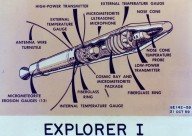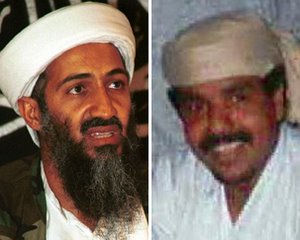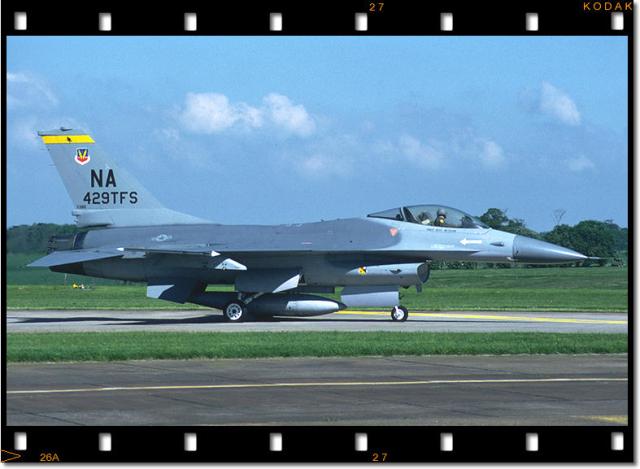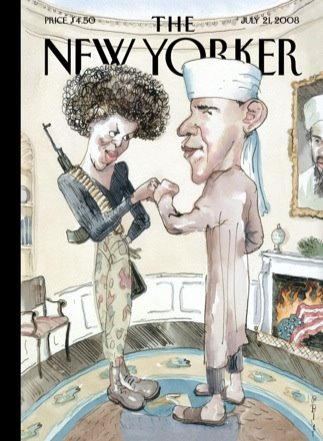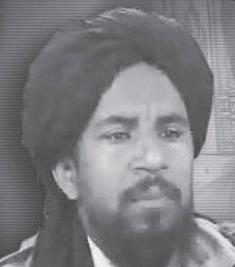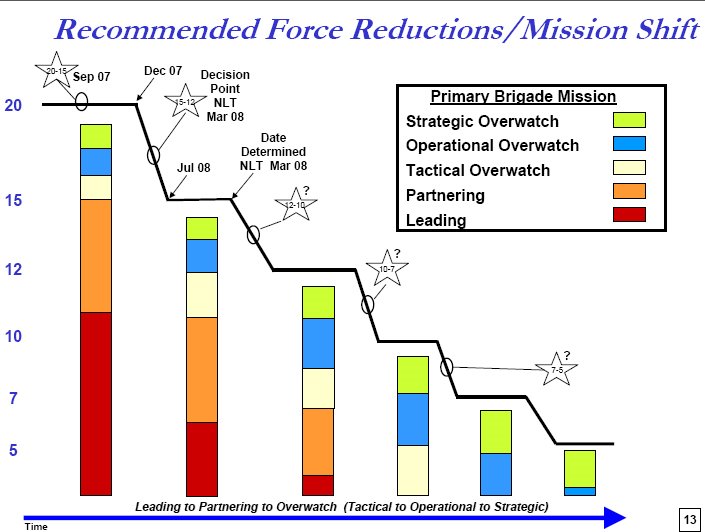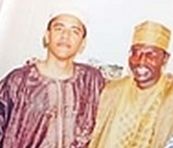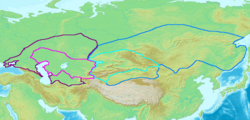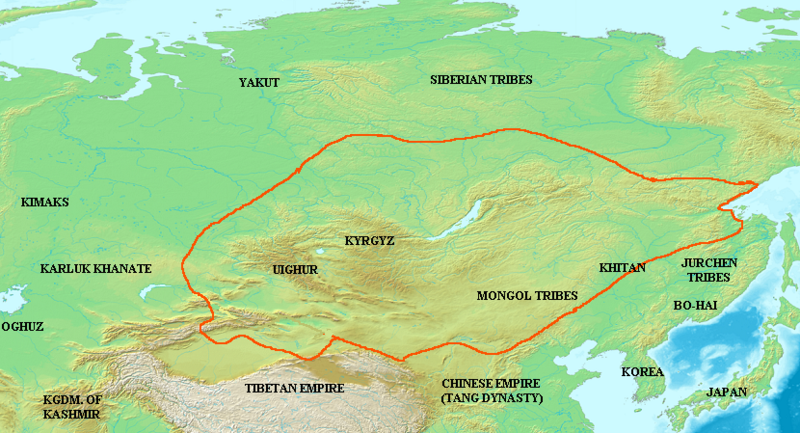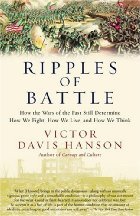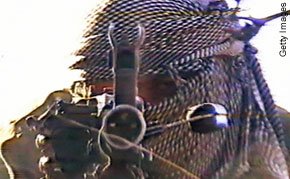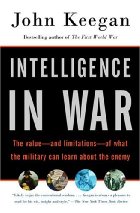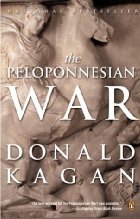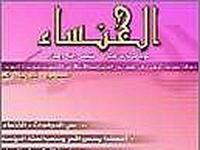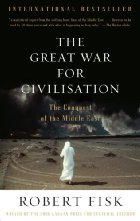
Although the thought of Noam Chomsky is amply represented in Fisk's journalistic tour-de-force in this work, he never acknowledges him and makes no reference to his ideas throughout. A reference to Chomsky does appear in the bibliography though but this is a form of dissembling from an otherwise forthright journalist.
Fisk's work is a fascinating study which waves his personal journalistic odyssey, psychological makeup, and family history into a compelling conquest narrative. "Bill," his war veteran father, gripped the teen age Fisk by trampling upon the hallowed British battlefields of his father's WW I battle memories.
Will Fisk reconcile his liberal, journalist's aversion to the horrors of war with his father's crotchety, war-scarred experience?
We won't know for sure but as readers we are offered a rare glimpse into the mind of a journalist who will be interpreting chaotic Middle Eastern violence through his lense of Chomsky and as a journalist haunted by his father's wartime memory.
Chomsky--Paul Berman tells us in Terror and Liberalism--holds that corporations greedily command the press and governments, and with these institutions at their behest, "drench the world in blood and misery" (p. 146). The freedom instinct though animates the human spirit to resist and the freedom instinct battles the greedy instinct. The battle between the two instincts explain nearly everything we see in world events.
As the Chomskyian view has unfolded and interpreted American foreign policy since the 1960s, Chomsky's analysis does not admit that pathological mass movements exist (Berman, 147). As described by Berman, we are all seduced by the attractive belief that "people are bound to behave in more or less reasonable ways in pursuit of normal and identifiable interests. It was a belief that the world is, by and large, a rational place" (Berman, 153). It is as Berman states: "In this country, we are all Noam Chomsky" (Berman, 153).
On the contrary, pathological mass movements, especially those based on faith, do exist. Blinded by Chomsky, Fisk is oblivious to what "should now be obvious to everyone that Muslims have more than their fair share of the latter," i.e., bad beliefs (Harris, The End of Faith, p. 108). Fisk is left with the lack of explanatory power inherent in many commentators who attribute the roots of Muslim violence on the Israeli occupation of the West Bank and Gaza, the collusion of Western powers with corrupt dictatorships, and the endemic poverty and lack of economic opportunity plaguing the Middle East. He usually can not see that he is also dealing with Middle Eastern elites and the `best and the brightest' of Middle Eastern society.
As Harris comments, the usual explanations do not account for the virulent theological hair-splitting that characterizes political Islam. Harris states:
the world is filled with poor, uneducated, and exploited peoples who do not commit acts of terrorism, indeed who wold never commit terrorism of the sort that has become so commonplace among Muslims, and the Muslim world has no shortage of educated and prosperous men and women, suffering little more than their infatuation with Koranic eschatology, who are eager to murder infidels for God's sake (Harris, p. 109).
Not only poor and uneducated are willing Islamic terrorists but the educated Muslim elites are ardent jihadists.
Islam is a religion of struggle and of conquest. If it were not, the bloodshed between the rival claimants to Mohammed's mantle, Shia and Sunni, would have reconciled long ago. But without the equivalent of a Reformation movement, the Koran is seen as a document as if wafted down the clouds from heaven, and all human actions are seen as subject to divine review. The Koran is beyond reproach or is not critically examined.
Indeed, one of the central propositions of Western thought is self-criticism (Paul Cartledge, Thermopylae, p. 205). The West is not beyond reproach but it is a tradition that reflects upon itself, criticizes the tradition, and re-applies and innovates with new ideas. Fisk describes Amira Hass, for example, the Israeli journalist who lives, voluntarily, though some might argue foolishly, in Ramallah in the heart of the Palestinian homeland. There is reflection and self-criticism in this valiant perspective.
Although the conquest, and the failure to grasp the futility of not criticizing received Islamic thought occurs before his eyes, Fisk only sees the conquest characterized by his psychology and his own private battle with inheriting British culture. Fisk sees: The West vs. Middle East, Christian vs. Muslim, Israeli vs. Palestinian, Power vs. conquest--all mediated as his conflict with "Bill," his father.
Fisk writes of "an arrogance of power" (p. xxi) as "the sins of fathers visited upon their children" (p. xxii). Indeed, Fisk is reporting "Bill" vs. Fisk. Fisk reflects that in 1992 he "stood upon the very paving stone"
where "Gavrilo Princep stood as he fired the fatal shot that sent my father to the trenches of the First World War. . . . That was the year in which my father died. This is therefore the story of his generation. And of mine (p. xxii).
Fisk is reporting his personal struggle and conquest of his father.
The parallels continue in Fisk's odyssey. The British descend on Afghanistan resulting in a series of British-Afghan Wars (1838-42, 1878-80, 1919-21) only to leave their dead behind. During the period of British aggression Bill is dispatched to fight in WW I; and while reporting, Fisk surveys early British accounts of Afghanistan characterized by "British heroism" and "Muslim savagery" (p. 35).
This survey will in turn be undone by Westerners such as British soldiers. And, the West will get what it has coming to it as a result.
In an account such as this then, the Ottoman slaughter of Armenians, although related, is not seen as a Middle Eastern atrocity. Fisk describes it as the "First Holocaust." Haven't the Germans flagellated themselves over the Holocaust? Have the Turks?
Fisk does not equate Middle Eastern atrocities as in the same class as Western intrusions in his detailed presentation of material. For example, on 17 May 1987 the USS Stark was hit by Iraqi Mirage missiles in the Persian Gulf where 37 American sailors were incinerated (p. 215). In this tragic mistake no human details are provided about the American sailors. They barely seem to exist. They don't have names and we do not learn anything personal about them. The only voices that are heard belong to impersonal U.S. government officials and statements.
Yet, an almost exact parallel exists in the unfortunate and mistaken shooting of the Iranian Airbus on 3 July 1988 by the U.S. but according to Fisk has an "appalling human dimension" (p. 259). Fisk details the human aspect of the atrocity and describes the families, the horror, and the sickening maiming of limbs and the deaths at American hands.
This is by no means the only human atrocity committed by the Americans. Fisk tells us of Raafat al-Ghossain, who dies at the hands of an American bomb in Libya on 15 April 1986. The eighteen year old artist, on holiday from school in England, and the family, wealthy Palestinian refugees live and work in Libya. Yes, there is the photograph of Raafat taking part in several Palestinian demonstrations in England Fisk tells us, but never mind, we are provided with an insight into her hopes, dreams, laments, and the desire for her to return to the family's Palestinian homeland. In any case, she fell victim to American bombing.
What are we to make of this? In a world where there are no innocents, no one is innocent.
The possibility that Raafat was a more dangerous student radical, or someone simply at the wrong place at the wrong time does not occur to Fisk. The American bombing, or acts brought on at least as much by Libyan leader Khadafi's intransigence, as American hard-line bombing strategy, is not entertained.
Fisk seems to miss that human cruelty and atrocities are the monopoly of no one. There are many losers in the appallingly inhuman atrocities in the clashes of the Middle East. Arafat, the betrayer of Palestine, comes off easily in Fisk's account. Why?
However, the banality of atrocities, and the unflinching Middle Eastern cultural value of death seems to escape Fisk's grasp. He can lament the deaths of ordinary persons of any culture, and I believe rightfully so, but Muslim v. Muslim atrocities, regardless of how outrageous, fail to elicit a response.
Most troubling though is the discussion of post-colonial Algeria. Granted France performed horribly in Algeria but how long can France be held responsible for post-independence civil wars? The tricks of government, according to Fisk, were learned from the French during the colonial era. Its as if the 1990s Islamic internecine struggles were somehow immune from inventing their own diabolical means of destruction (p. 522-585). "The Plot" is Algerian paranoia though which saw the U.S. behind every bush (p. 546). Dialogue with Islamists was thought to be suspect as well. If anything, the U.S. hoped the Islamic conflict could be resolved. Even when the Islamists and the Algerian government commit mutual, despicable horrors, even invoking the Koran's blessing, Fisk fails to criticize (p. 548). Though the U.S. was not present during the horror, according to Fisk though, they can be criticized for arriving with too little, too late, along with the U.N. which should bear responsibility for human rights abuses (p. 585). Its damned if you do, damned if you don't kind of thinking. The section on Algeria is not for the faint of heart. Do not eat before reading this section.
Why do Islamic societies produce such heinous abuses of humanity? I would certainly like to know. If there is no Plot, because we know the U.S. has no designs on backwater places like Algeria or Libya, why are the Islamists so brutal? Why is there so much killing and bloodshed? Fisk does not tell us.
At some level, Westeners, including Fisk, are profoundly motivated to act with integrity, compassion, and reflect seriously on their behavior. I fear Fisk is seduced by the same phantasmal (Michael B. Oren, Power, Faith, and Fantasy, pp. 13-14) force that has clouded so many Western observers. He seems though to have no expectation of somewhat reasonable behavior by his informants, though in at least one instance he himself has to fear for his physical safety while under personal attack in Afghanistan.
I hope Mr. Fisk can resolve his issues of self-flagellation through which he sees the Middle East, or the Other, and in that way overcome how his father never accepted the basic humanity of the Other during his wartime experience. Fisk is filled with outstanding powers of observation, and he is an extremely important source because of his early access and interviews with Bin Laden (Michael Scheuer, Through Our Enemies Eyes, pp. 408-09), his journalistic relationship with Arafat, and his touching descriptions of ordinary Middle Easterners and their experience. His reporting though is tainted by a naivete about his subjects. The Middle East, as anyone will tell you, is a rough neighborhood.
Fisk defines war early on as "about death and the infliction of death" (xviii). Yes, Mr. Fisk, you got that right.
 Graphic source: CNN
Graphic source: CNN

